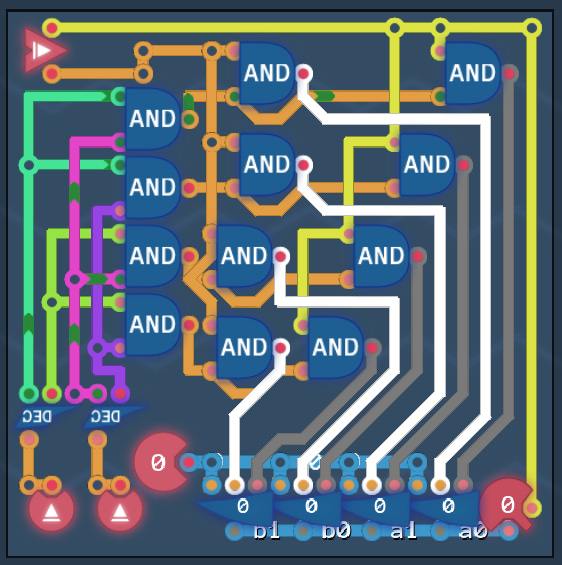Games with Logic
A few fun diversions if you want to learn how electronics and computers work.
I don’t spend a lot of time on computer games. Sure, they’re fun, and I certainly will keep digging into a few things like Falcon and dabble in strategy games, but more and more of my creative time is in the real world - handyman work, returning to drawing on paper, and playing music - and even on computers I’m spending more time learning programming.
In that vein, I’d like to point out a few games that are incredibly niche, yet let you learn and do things that would be difficult, especially when you can no longer trot down to the nearby radio shack for parts.
Turing Complete
It’s in beta, and to a degree assumes you know what a NAND gate is, as well as OR, AND, NOT, and so forth, and doesn’t do a lot to explain what the heck a truth table is. It has a sandbox mode, but the campaign steps you through creating various types of logic gates out of NAND gates, then how to create memory and switching systems, and goes on to create a virtual CPU.
It’s biggest weakness is that more time really needs to be spent on clarity of documentation and instructions. Not all changes in the UI have been reflected in the instructions, and I’ve found cases where previous working solutions not only no longer work, but components that used to be available, are not. It also has some moderately sarcastic humor that you’re an experimental subject for aliens to do intelligence tests. Most of these issues are presumable due to the development cycle, and the fact that it is very much in early access.
A proper discussion of how we can no longer release working games and instead go through these long beta periods is more appropriate on another day.
Human Resource Machine
While we’re on the subject of very low level work, no-one really programs in assembler any more. That said, if you ever wanted to know what your computer actually does at a lower level, and why, for example, division is so computationally expensive, Human Resource Machine is excellent.
The humor is a mixed bag for me, but generally isn’t grating. You’re an office worker moving things from an input conveyor belt to an output belt. Depending on what needs to be done, some boxes will be copied over, or you may have to rearrange or sort them. To do this you are given a number of tiles to place data packets (shown as boxes), and a basic assembler-style language that lets you increment, decrement, place things in memory slots (the floor tiles). As you go through you get to more and more complex puzzles, and also get introduced to more and more complex concepts like pointers that are generally hidden in higher level programming languages.
Honorable Mentions
I have spent very little time in either of the below so cannot fairly comment, but they so far appear interesting.
Shenzen I/O comes from the creator of the puzzle game Spacechem and the card game Nerts. The one-line pitch is : BUILD CIRCUITS. WRITE CODE. RTFM. It allows you to assemble various electronic components and program them.
Next up, also in early access like Turing Complete, is Virtual Circuit Board.
If they look at all interesting, check them out on Steam, etc., and give them a shot.









Just downloaded the first two and wow!